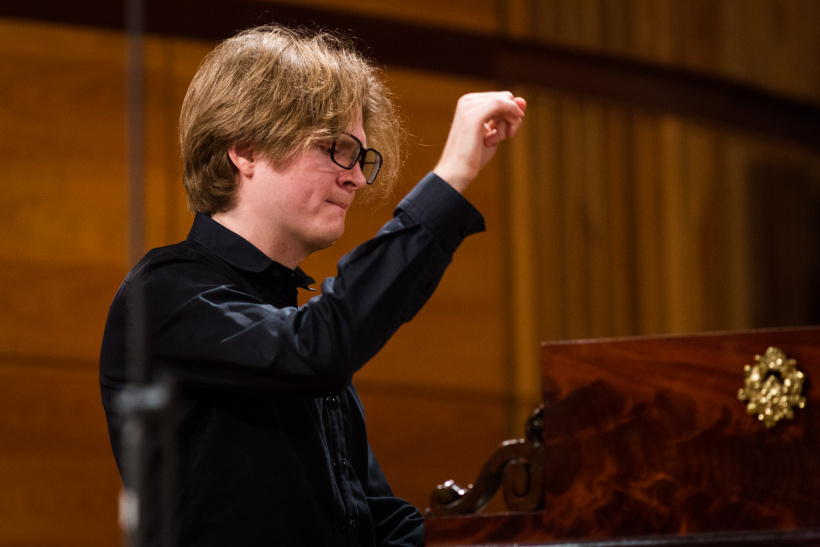Ablogin brings an improvisational, intimate style to Miami Piano Festival
With a poised demeanor, pianist Dmitry Ablogin graced the Colony Theater stage Saturday evening for the Miami International Piano Festival’s Discovery Series.The program was tailored to this young artist’s strong suits, with delicate and intimate soundscapes ensuing from the first notes and following through the entire performance.
Subtitled “A Recital of Friendships,” the program brought together works by Fanny and Felix Mendelssohn, Robert Schumann, and Frédéric Chopin. In Romantic-era fashion, Ablogin created extemporaneous preludes and interludes that forged smooth transitions between the pieces.
Music of Fanny Mendelssohn opened the program with three Songs Without Words and “September” from Das Jahr. Ablogin’s minimal movements and transparent voicing created a contemplative atmosphere and the pianist drew the audience in with his sophisticated expression and beautiful soft dynamics. In “September: At the River,” the pianist created vivid imagery through the melody’s exchange between the hands under the gurgling of surrounding arpeggios.
Following were Schumann’s Arabeske, Op. 18, and Etude in Canon Form in A-flat major, Op. 56, no. 4. An inventive Arabeske that journeys in and out of characters was individually rendered by Ablogin. His overuse of rubato at times distracted from the larger structure of the piece. That apart, the Arabeske was played with elegance and Ablogin’s differentiation between the playful, songful, and impassioned elements was always clear.
The Etude in Canon Form displays Schumann’s reverence towards Bach’s polyphony. Here Ablogin showed his more extroverted side.particularly in the denser motivic dialogues of the middle section.
Two Songs Without Words and the Variations Sérieuses by Felix Mendelssohn closed the first half. Written as part of the project to raise funds for Beethoven’s bronze statue in Bonn, the D minor theme and 17 variations of Op. 54, further displayed Ablogin’s aptitude for reflective pieces. The slow, choral-like, and fugal variations were executed with ease and a refined touch. By contrast, variations Nos. 4, 8, and 9 exposed the pianist’s light and crisp articulation. In his effort to control the pouring energy of the frolicsome figurations, these variations sounded with a slightly nervous character. The final variation and coda erupted with increasing sonority and excitement.
The second half was centered around Chopin in a mélange of polonaises (Op. 71, no. 2, Op. 26, no. 1, and Polonaise-Fantasie (Op. 61), mazurkas (Op. 50, nos. 2 and 3), nocturnes (Op. 15, no. 1 and Op. 27, no. 2), and the “cello” Etude Op. 25, no. 7.
These compositions also showcased Ablogin’s blend of finesse and bravura, especially in the grandiose climactic section of Chopin’s Op. 61 and his treatment of the bel-canto inspired passages. However, the Russian pianist’s improvisational style seemed to be a double-edged sword. While it allowed for rhythmic undulations and a sense of freedom, it also created repetitive displacements of the beats, particularly in the coordination between hands.
Throughout, Ablogin demonstrated a command of dynamic layering and created enveloping sonorities that warmed up the theater, including with his encore, Chopin’s E-flat major nocturne Op. 9, no. 2. Perhaps, even with the occasional issues due to his spontaneous style, the recital conveyed a rich nostalgia with this trip back to the era of high romanticism.
Carlotta Maestrini performs 3 p.m. Sunday at the Miami International Piano Festival, followed by Ariel Lanyi at 7:45 p.m. Both performances are at the Colony Theater in Miami Beach. miamipianofest.com
Posted in Uncategorized
Leave a Comment
Sun Jan 13, 2019
at 12:33 pm
No Comments

